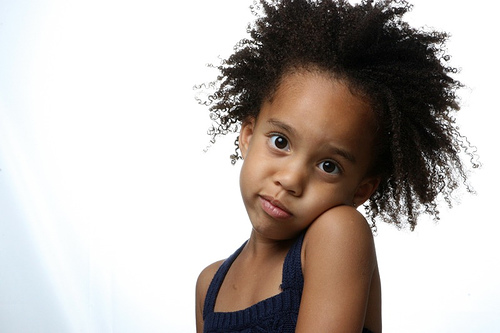There is an old Japanese folk tale about a radish, carrot and burdock that take a bath together. The story ends with the burdock remaining black and dirty because he did not wash his body properly, while the radish is sparkling white and clean. No one seems to remember that no amount of hot water nor scrubbing can change the burdock’s natural black colour, so the story is still being told today. It turns out that some children of African descent have been taunted and called ‘black and dirty burdocks’ by their Japanese peers who are familiar with this story. I once met a Japanese mother, whose son’s father is an African American, and she had grown very concerned about her kindergartner’s self-esteem. She spoke with great anguish about how he would cry inconsolably because his skin was much darker than hers. At that time, I had no idea what to do or say to help her. I just sort of wondered why she didn’t just leave Japan. But, since that meeting, I’ve had to think about my own child’s racial identity as a black baby in Japan. Whether we are raising our children in a black extended family, a biracial home, a predominantly white neighbourhood or a homogenous Asian country, we want them to have healthy esteems, to be confident, and to be prepared to effectively handle discrimination from the playground to the boardroom. This is why it is so important for us to understand how self-esteem is built and the importance of group identity.
If we want to facilitate the recognition of our children’s true capacities, they need to have self-esteem and self-respect, but they also need to be able to identify with and develop an attachment to a group. This is why Marcus Garvey said, “A people without the knowledge of their past history, origin and culture is like a tree without roots.” When the world looks at our children, the first thing they see is their skin colour – the badge of the African race. So, though we may have other philosophies about who we are and who our children are, we must prepare them to live in a world who views them as black – first and foremost. This means that we will need to provide opportunities for them to connect with their African heritage. Their identity needs to be grounded and undeniable, but it has to be moulded and reinforced through our approaches to parenting and education. The strategies I will list below are merely suggestions and are in no way complete. But, they are great place to start.
1. Limit the Media
If your child spends multiple hours of every day for fifty-two weeks of two decades absorbing broadcasting that portrays black people in a negative light, this concept will shape his mind and the thoughts of inferiority will challenge every attempt at greatness. Fill the void by giving them African-centred toys, books and music.
2. Supplementary Education
You may choose to educate your child at home or you rely on the conventional school system. Either way, you need to supplement the core curriculum (of reading, writing and arithmetic) with programmes like African Saturday School. If one is not in your community, you can identify activities in art, music, geography and history that allow your children to take a journey into Africa and African culture.
3. Create Family Traditions
Develop new family rituals like a bedtime or farewell blessing and words of affirmation, or special holidays like African Liberation Day. But, most importantly, ensure your children go through special rites of passage, like a Red Party for a girl’s menarche or an African naming ceremony.
4. Establish Standards of Excellence
Your child must be able to identify excellence in every aspect of life that was modelled by someone who looks just like them. So, it is important to fill your home with positive images of African beauty, strength, success. When your child is tempted to stray, you can always remind them of those who have done it before.
5. Monthly Themes & Historical Events
Don’t wait for the 28 days of February to draw for a few prominent African American names. Focus on a different African Hero for each month of the year. Or choose a theme like Science, Cuisine or Fashion and explore the African exploits and expressions in those areas. You can also make it a family project to hunt down significant events in the history of African peoples, or use existing research to identify important dates on the calendar.
6. Recite and Discuss
There are so many African proverbs to stimulate family discussions about wisdom and to encourage the habit of journaling. You may also want to have your children memorise the 42 Laws of Maat as an ancient African guide for right living.
7. Study an African Language
Over 140 million people speak Swahili, making it an easy language to find learning resources and tutors for. Arabic is spoken by about over 300 million people and the most widely spoken variety originated in the Nile Delta of Egypt. Either study would equip them to communicate with most continental Africans.
As your child becomes more culturally aware and develops a solid sense of self, their racial pride will be a significant feature of their self-worth and equip them to dilute any attacks they may face on their blackness. We must never forget, that ‘to know is to love’, that’s why the African proverb says, “Man, know thyself.”
Didan Ashanta is a natural living enthusiast who blogs at DidanAshanta.com. A native of Jamaica, she currently lives in Tokyo with her husband and 9-month-old daughter.

